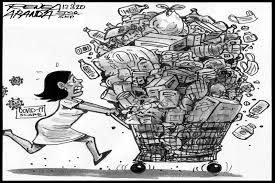 |
| USA, Europe. panic-buying heraldnet.com |
 |
| Covid-19 pandemic and panic-shopping. you tube. |
 |
| panic-buying. coranavirus. philstar.com |
A senior economist at FAO and agricultural analysts said that panic buying could drastically push world food prices even though there are ample supplies of staple grains and oil seeds in key exporting nations, the lock-downs and self-imposed curfew to prevent the spread of covid-19 pandemic are good for our families' welfare in the long run. Increasing cases of virus across Europe
and the United States, with the number of deaths in Italy outstripping those in mainland China are appearing in media. we need to put up certain inconveniences to control the emerging situation; if not, it may spiral out of control With over 270,000 infections and more than 11,000 deaths, the epidemic has tightened the vice-like grip on the world, drawing parallel with WWII and the 1918 Spanish flu pandemic.
 |
| panic-buying www.philstar.com |
 |
| US Dept. store, panic-buying. coranavirus. washingtonpost.com |
Let us take a look at the psychological mechanism behind panic-buying. Driven by anxiety and confusion in the wake of quick spread of covid-19 virus , panic buying has been rife in many countries in Europe, US, Canada and in India too. People are busy stockpiling grocery, hand sanitizer, medicines, toilet paper, etc. In counties like the UK there are restrictions on hygiene products, not to speak of toilet papers According to Paul Marsden, a consumer psychologist at the university of the Arts, London the answer lies in the 'psychology of therapy' - we buy with the main purpose of 'managing our emotional state. ''a sort of taking back control in the world where you feel out of control. Panic buying is related to ''three fundamental psychological needs'', they are: 01. autonomy or need to control, 02. relativity - the question of ''my shopping'' via a-vis ''we shopping'' and 03. competence - ability to achieve. when a successful shopping is done in the middle of competition, The person is overwhelmed by the sense of ''self-pride'' - I am
a successful shopper. Here, the people are pushed to a selfish
mode.
Sander van der Linden, Asst prof. of social psychology at Cambridge univ, GB says here at play are corona-specific as well as generalized factors. In the midst of conflicting messages from the powers that be, for example President Trump's downplaying of
the outbreak of corona virus in the US on Twitter and the reports from the US health department, Americans are confused over next course of action by the Fed. According to CDC - Centers of Disease Control the virus is present in 35 states. So, in the case of panic buying, 'fear contagion' was taking the hold' according to Prof. Linden.
In a scenario like this, the reasoning power of the people is under stress and vague and they feel compelled to look at what other people are doing. If others go on a shopping spree, not out of necessity, but out of fear of shortage of food, etc then others do the same. The empty shelves in the supermarkets in many places send a clear signal to them to follow other buyers: be early before the stores go empty. This kind of mass behavior is equal to a person encountering a poisonous snake. When he jumps to safety on seeing the serpant, people behind him do the same. This kind of jungle behavior is common in a panic situation. A few items like sanitizers or toilet papers may get the icon status of mass panic. In the present context where uncertainty rules the roost, people will get into a "panic zone" which is conducive to neurotic and irrational behavior. Peter Noel Murray of New York based member of the American Psychological Association says if authorities send a positive signal about the virus, they can calm the panic-buying trend. In this situation cognitive factor is cognitive bias that is giving more emphasis on unpalatable stuff triggers the panic button in us. When a plan crashes it does not mean all planes will crash. The terrible thing is categorization.
Take the case of Spanish flue, Murray says that killed 50 million people worldwide in 1918. Our emotional side works overtime leading us to find an answer in "self-affirmation" that we are going to be dead one day and the mind begins to deal with it through the control mode. 'Self-affirmation' normally takes over in a stressed situation. This post is based on an article cited here: https://www.cnbc.com/2020/03/11/heres-why-people-are-panic-buying-and-stockpiling-toilet-paper.html
Tit-bits:
01. There have been about 436,000 confirmed cases and 19,600 deaths globally. In the United States, there have been about 55,200 confirmed cases and 802 deaths.
02. Covid-19 cases in India rise to 606 as on 25th March, 2020.
03. 2500 people in Kerala, India have been arrested for violating lockdown orders.
04.71- year old prince Charles tested positive for the novel coronavirus; now he is self isolating.
https://globalnews.ca/news/6679692/coronavirus-panic-buying-warnings-expert/
https://economictimes.indiatimes.com/news/economy/indicators/panic-buying-lockdowns-during-this-pandemic-may-drive-world-food-inflation/articleshow/74742932.cms?utm_source=contentofinterest&utm_medium=text&utm_campaign=cpp









